 Some cases of vertigo are strangely treatment-resistant.
Some cases of vertigo are strangely treatment-resistant.
Although treatment may improve symptoms for these patients, slight vertigo still remains.
Italian researchers have just discovered that a supplement can clear up this residual dizziness. Their study appears in the journal Clinical Pharmacology: Advances and Applications.
Researchers recruited 258 patients whose vertigo had not completely disappeared upon the completion of their treatment.
They were split into two groups: 127 people received a polyphenol supplement for 60 days, and 131 people received no medication.
The scientists evaluated the subjects using several different measures at the beginning of the study, after 30 days, and again after 60 days.
They gave participants a questionnaire to measure their subjective experiences of vertigo symptoms as well as a questionnaire to measure their nausea and vomiting.
In addition, participants were asked to complete the dizziness handicap inventory scale to assess the severity of their dizziness-related impairments.
On top of all these questionnaires, the researchers conducted a static posturography assessment, an objective test of dizziness. This normally involves exposing patients to a set of conditions, movements, and sensory triggers, during which specialists observe their ability to remain upright with their heads stabilized.
After 60 days, compared to the subjects who had received no treatment, the subjects who had received the supplement reported feeling less dizzy and nauseous. They also reported an improvement in vertigo-related impairments while accomplishing daily tasks.
This seems to suggest that a polyphenol supplement is a relatively effective way to get rid of those last vertigo symptoms that remain after treatment.
You can buy a polyphenol supplement, but make sure that the supplement is food-derived and not synthetically produced in the laboratory.
You can also simply eat as many polyphenol-rich foods as you can fit into your diet.
These foods include:
1. Red wine
2. Dark chocolate and cocoa powder
3. Seasonings, especially cloves, dried peppermint, and star anise
4. Berries, especially blueberries, blackberries, strawberries, red raspberries, and black chokeberries, if you can find them
5. Other fruits, such as blackcurrants, plums, sweet cherries, and even the humble apple
6. Black and white beans
7. Nuts, especially hazelnuts, walnuts, almonds, and pecans
8. Artichokes, red onions, spinach, any form of soy, and black and green tea
Stack your diet with these foods and see if it helps.

 Overcoming IBD
Overcoming IBD Multiple Sclerosis
Multiple Sclerosis Banishing Bronchitis
Banishing Bronchitis Gum Disease Gone
Gum Disease Gone Overcoming Onychomycosis
Overcoming Onychomycosis Neuropathy No More
Neuropathy No More The Prostate Protocol
The Prostate Protocol Brain Booster
Brain Booster
 Ironbound
Ironbound
 Solution for Shingles
Solution for Shingles
 The Bone Density Solution
The Bone Density Solution
 The Ultimate Healing Protocol
The Ultimate Healing Protocol
 The Parkinson's Protocol
The Parkinson's Protocol
 The Chronic Kidney Disease Solution
The Chronic Kidney Disease Solution
 Overthrowing Anxiety
Overthrowing Anxiety The Fatty Liver Solution
The Fatty Liver Solution The Hypothyroidism Solution
The Hypothyroidism Solution
 The End of Gout
The End of Gout The Blood Pressure Program
The Blood Pressure Program
 The Oxigized Cholesterol Strategy
The Oxigized Cholesterol Strategy
 Stop Snoring And Sleep Apnea Program
Stop Snoring And Sleep Apnea Program
 The Arthritis Strategy
The Arthritis Strategy The Vertigo & Dizziness Program
The Vertigo & Dizziness Program The 3-Step Diabetes Strategy
The 3-Step Diabetes Strategy Hemorrhoids Healing Protocol
Hemorrhoids Healing Protocol The Erectile Dysfunction Master
The Erectile Dysfunction Master Weight Loss Breeze
Weight Loss Breeze The IBS Program
The IBS Program The Insomnia Program
The Insomnia Program The Migraine and Headache Program
The Migraine and Headache Program The Neck Pain Solution
The Neck Pain Solution The Menopause Solution
The Menopause Solution The Ejaculation Master
The Ejaculation Master The TMJ Solution
The TMJ Solution The Acid Reflux Solution
The Acid Reflux Solution The Fibromyalgia Solution
The Fibromyalgia Solution The Psoriasis Strategy
The Psoriasis Strategy